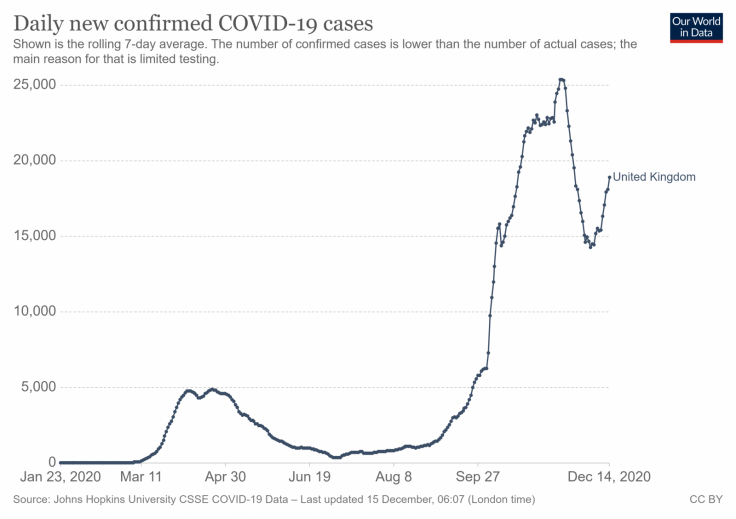Like all viruses, the new SARS-CoV-2 virus that causes COVID-19 disease has also mutated multiple times since the outbreak began in Wuhan, late December 2019. Although the seven strains of the virus that have been detected so far aren't worrisome, another strain has scientists concerned. The new strain of the novel Coronavirus has been detected in the U.K. with over 1,000 people already infected by it.
The new strain containing several different mutations has been found in southern England in the country's genomic surveillance in the last two months. However, the virus has already spread to over 60 locations in England and the new cases are rising faster as per Matt Hancock, England's Health Secretary. Many parts of the U.K. are currently under strict lockdown due to rising cases of COVID-19.

"We do not know the extent to which this is because of the new variant but no matter its cause we have to take swift and decisive action which unfortunately is absolutely essential to control this deadly disease while the vaccine is rolled out," Hancock told the parliament, adding that the World Health Organization (WHO) has been notified of the strain.
Is It Deadlier?
Another strain of the virus was detected first in Europe before it spread to Malaysia. That strain was more infectious than the first one found in Wuhan. In the new strain, the mutation is in the spike protein of the virus. The virus uses the spike protein to latch on to a cell and infect. While there is no evidence to suggest that the new strain is deadlier than other novel Coronaviruses, experts believe it may be more infectious.

The new strain contains multiple mutations in the spike protein, and the most troubling of them all is something called 'deletion'. In this process, while mutating a virus lose genetic material. In the case of the new strain, it has lost two amino acids from the spike, making it more infectious and transmit easily. Since March, the same mutation has been detected in many countries including Malaysia and Southeast Asia, making the virus 10 times more infectious. But the deletion was at a low level. As the new strain, which was first spotted in late August and early September in England, has two deletions, it could be even more infectious than the strain found in Malaysia.
Ravi Gupta, a professor of clinical microbiology at the University of Cambridge, told Guardian that the deletion was probably to help the virus escape. "We think there's a mechanism for the virus to start escaping. We need to crack down on it. We don't know what it's going to do long term but we can't take a chance on it. It's unlikely it'll make people sicker, but it could make it harder to control."

What Does It Mean for Vaccines?
The detection of new strain came to light amid a mass immunization drive in England. In the first phase, around 800,000 doses will be given. However, the detection of the new strain has concerned many people as a mutation in the virus often renders existing vaccines useless and resistant. A vaccine generates antibodies by triggering an immune response in the body and disables the spike protein of the virus. But as the mutation is of the spike protein and can potentially evade the antibodies, the concern is whether the existing vaccine will be effective.
Dr Michael Ryan, executive director of the WHO, said that the mutation was common and should not be an issue. However, scientists are researching at Porton Down and other BSL labs to see if the new strain could cause a potential problem for the vaccine as many questions remain unanswered. But the existing vaccines can be tweaked to suit the new strain.
"The question, as we've had most recently with the mink variants in Denmark and previous variations, is: does this make the virus more serious? Does it allow the virus to transmit more easily? Does it in any way interfere with diagnostics? Would it in any way interfere with vaccine effectiveness? None of these questions are addressed yet," Dr Ryan said.








